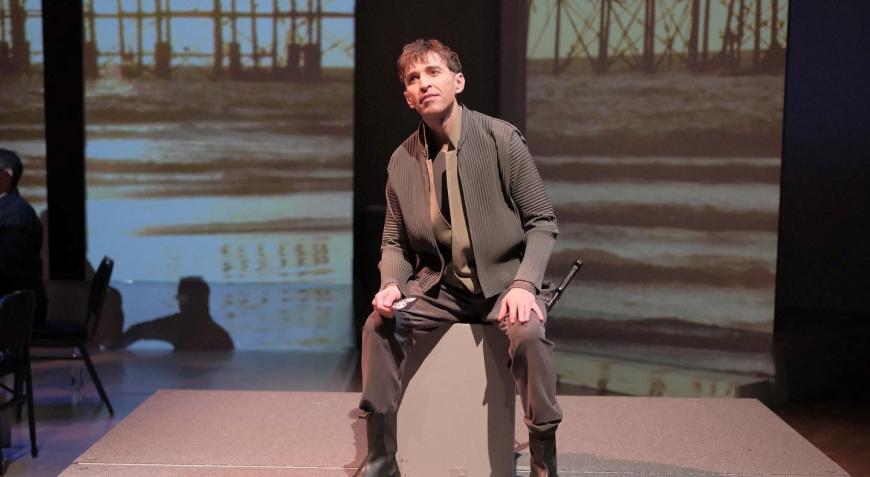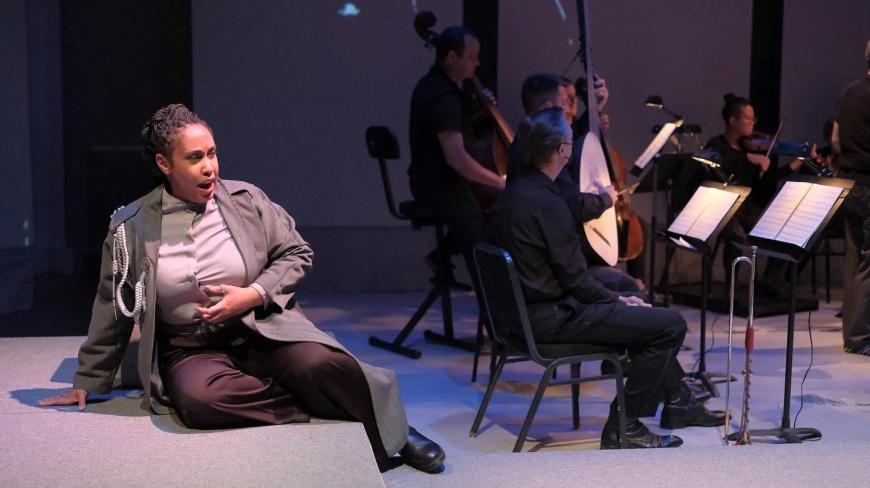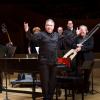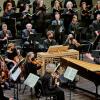
In a musically electric, dramatically keen, sexually charged production at the Taube Atrium Theater last week, Philharmonia Baroque Orchestra breathed fervent life into the Handel rarity Amadigi di Gaula (1715). Everything came together for an unalloyed triumph, with a large, enthusiastic audience on hand to witness the second of three performances on Friday, April 21.
A cast of four sang and acted with ardor, urgency, and theatrical immediacy. The orchestra, with Music Director Richard Egarr conducting from one of two thundering harpsichords, performed with momentum, fiery abandon, and finesse. Stage director Louisa Muller made the most of a wide, shallow playing space, bordered on either end by two small, raised plinths. Christelle Matou’s smartly tailored, self-effacing costumes, in tones of dove gray and taupe, kept the focus on the singers’ faces and forms. Ian Winters’s haunting and sensuous projections — of a seaside palace ruin, rippling rock facades, the White Cliffs of Dover, and the singers’ dreamily besotted faces — supplied a seductive visual subtext for the story.
In the title role, countertenor Anthony Roth Costanzo made a persuasive object of two women’s desire, his voice and bearing by turns delicately ingenuous and firmly virile, downshifting now and then into a throaty lower register. Soprano Deanna Breiwick, as his true love Oriana, conveyed a trusting innocence, her voice sweetly pure at the upper end if a bit thin in the middle.

Soprano Nicole Heaston, in a vibrant, incendiary performance as the sorceress Melissa, lit the opera’s fuse. Using everything from bewitching gestures to knife-wielding threats to steely coloratura, Heaston fully embodied her character’s determination to have Amadigi for herself. In the trouser role of Dardano, who adores Oriana and, at one point, spirits her away, mezzo-soprano Briana Hunter was menacing, stolid, and doomed to an offstage death.
While Handel and librettist Nicola Francesco Haym provided the predictable love-affirming happy ending, it was the passion and darkness, the coiled eroticism, that drove this 100-minute evening. Egarr and his band got things off to an arresting start with an overture of slashing attacks and bristling passagework. That served fair notice of what was to come.
With her knife unsheathed from the start, Heaston gave the villainess Melissa a transfixing allure. Leaping onto one of the raised platforms, she wielded her haughty, desperate superpowers at a distance. With a flick of her wrist, she could reel Costanzo in like a helpless fish or deliver a gratuitous blow below the waist from across the stage. In one furious, frustrated aria, Heaston delivered Handel’s long, ornamented lines with glittering, show-stopping ferocity.
In another act of determined manipulation, she used her powers to trick a smitten Oriana into thinking Dardano was actually her beloved Amadigi. With Handel’s faux bucolic music as ironic commentary, the three performers played the disguise bit with elegantly staged poise.
The production was full of theatrical flourishes that ramped up the heat in Handel’s score. In an early love scene, Costanzo pecked kisses into Breiwick’s neck in time to the phrase’s accents. The effect was both comic and sexy. Later, in a rare duet, Costanzo and Heaston were joined in sinuous parallel musical lines to suggest both formal distance and subliminal attraction.
The singers and orchestra kept finding the visceral power in a piece deemed “the finest of Handel’s early London operas” by the Baroque expert David Vickers. In this absorbing and combustive production, PBO emphatically affirmed that judgment.




